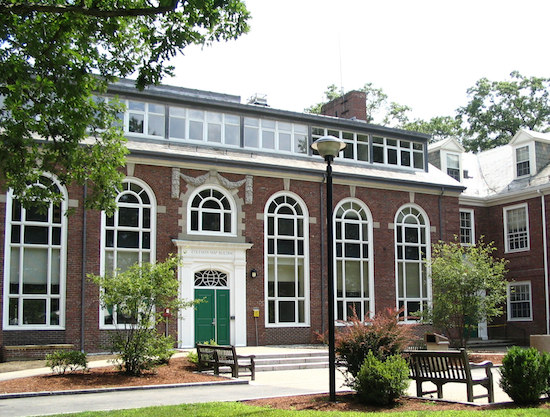How does Babson teach entrepreneurship to students? Is there a signature class that all students are required to take?
I think one thing that none of our peer schools have at this point in their curriculum is the entrepreneurship business course we offer freshman year, Foundations of Management and Entrepreneurship (FME). The class goes on the entire year, and students are split into teams and asked to imagine a business, write a plan and then pitch the idea to a group of faculty. They then get up to $3,500 in investment dollars to start their company. They run the company and liquidate the company by the end of year, so by the time they get to sophomore year, they’ve already run and closed down a business.
When they’re sophomores, they can apply not only what went really well, but also what went terribly wrong and learn from the various pitfalls they encountered. We always talk about how entrepreneurs fail. We tell students that this is your chance to be in a monitored learning environment and fail.
Another differentiator is that we have a philanthropic side to the FME class. While they are running the company, they engage with a nonprofit of their choice and when the company becomes profitable, they donate the proceeds to the nonprofit. That integrates the philanthropy aspect into business. I don’t know of another school that does that.
What trends are you seeing in applications to the school now that entrepreneurship is gaining such momentum among prospective applicants?
When I first came here, I saw many students who said they wanted to come to Babson because they wanted to be an accountant or saw a great future in finance. Now, it is more of I am coming to Babson because I want to learn about both business and entrepreneurship, and let it take me wherever it can. I think there is a lot more excitement around that possibility. I think the era of the ten-year plan is over. Now it is, “I’m going to invest in my career,” and with that comes a cool kind of entrepreneurial mindset. It is rewarding to see the kind of students we are attracting. They are risk takers and creative types who are up for anything.
Money Magazine ranked Babson no. 1 last year for overall value and return on investment, a topic which more and more families are considering these days when choosing a school. How does that ranking play out on the career front for Babson students?
Our career development process here is very unique, and students really benefit from being in a smaller environment. Our office pushes students to think about their career goals and career paths. They learn how to put their best foot forward in interviews and we teach them about proper etiquette. As a result, 99 percent of students emerge from Babson employed, and the average starting salary last year was $54,000, which means they are paying off their student loans at higher rates.
How did the 21 percent boost in applications this year impact the application process and the incoming class profile?
It gives us the opportunity to become more selective, which for us means geographic diversity and socio-economic diversity. We are excited by the increase in first-generation students that are coming to Babson. We’ve started doing programming around the first-generation experience and better preparing them for college.
This year, within that 21 percent increase, we saw a lot of very strong international applicants. In the past we weren’t able to offer financial aid to those students, and it was a very resourced population. This year, we set up a Global Scholars Program to attract a range of socio-economically resourced students, and had the capacity to offer them scholarships. We wanted to attract students from countries that are typically not able to send their students to the U.S for education, and this allowed us to go to Africa for the first time in our recruitment travels. Now we have students coming from Rwanda, Kosovo, Brazil, Hungary, the Republic of Georgia and Turkey. They’ll start in the fall and then they’ll get additional financial support once they get here as well. Having an increase in applications gives us a more of a choice as to whom we can give these opportunities.
Another thing we are really attuned to this year is being able to sort of bridge the gender gap. Women have traditionally been a minority here, and we’d been inching towards our goal of being 50 percent women. The incoming class next year will be 53 percent women, so we are really excited about that.
What advice do you have for students and parents who are starting the college application process?
I think my most fundamental advice to curb the expectations they have about what business is and what is taught in a business program. They’ll be pleasantly surprised if they look into the curriculum and see what goes into preparing students for a career in business. There are course in liberal arts, history, language and other areas.
I would also say that prospective students looking at business schools should get on the road as soon as they can this summer and see first-hand what happens at a business school. It’s one thing to read about what goes on at a school, but when they’re sitting in the classroom and in public spaces like the dining halls they can get a better experiential impression. Even if they have no intention of looking at a larger school, they should still go look at a large school so they can see what that looks like in person.












Questions about this article? Email us or leave a comment below.